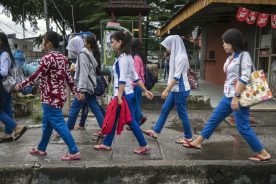[ad_1]
Earlier this year, the Malaysian government floated an idea for an upcoming Senior Citizens’ Bill. Among its various provisions, the bill would enact financial penalties for people who place their elderly parents into formal care institutions. The fact that such a move was even considered not only highlights the outsized role of filial piety in Malaysian society but, by enforcing a statutory duty legally requiring adult children to provide for parents in old age, simultaneously reinforces the responsibility of care as one that should be shouldered by younger generations.
But this move also masks an implicit gender bias. With women often performing the lion’s share of care work in the home, filial support laws like those in the proposed Senior Citizens’ Bill threaten to disproportionately affect women.
This comes as care needs surge amid Malaysia’s rapidly aging population and declining fertility rates. The country became an aging nation last year, with old-age dependency expected to rise threefold by 2040. This means that not only will caregiving responsibilities rise for women, they will also have fewer family members to rely on for help. Indeed, estimates suggest that care constraints are already an issue: Malaysian women spend at least 10 hours more on unpaid care work a week than men. This unequal care burden has economic implications for women, including ‘care penalties’ in terms of reduced lifetime earnings, lower job security and limited access to social protection.
In fact, the interaction of filial support laws with the gendered distribution of caregiving responsibilities could have severe consequences for gender equality. Malaysian women already have some of the lowest labour force participation rates in the region. At 55.8% in 2022, the labour force participation rate for women fell short of Malaysia’s target of 60%—despite Malaysia’s women having already outnumbered and outperformed men in higher education for the past two decades. Women constituted 69.6% of working-age individuals outside the labour force, with “household and care responsibilities” ranking among the primary reasons. As such, enacting legal obligations of filial support will deepen gender gaps and further women’s economic exclusion.
Malaysia’s filial support laws find their origin in notions of the welfare state—which has long borne the hallmarks of Confucian ideology. This approach is often characterised by relatively modest levels of public investment in social welfare and limited state support in care infrastructure, with care instead being seen as the responsibility of the individual and family. Such influence remains prevalent across Asia and has motivated similar filial support laws in countries like China and Singapore.
However, such laws do little to balance an adult child’s financial capacity versus the needs of an elderly parent. They also do not account for complex family dynamics that complicate care provision in old age. As the labour force shrinks amid slowing population growth, Malaysia can ill afford to pursue filial support laws that push more women out of the workforce to meet growing care obligations.
Besides undermining progress towards gender equality, relying solely on adult children and the family unit for informal care might also be wholly insufficient and unsustainable to meet the demands of a rapidly aging society. Instead, it could be more effective to consider policies to support informal caregivers as a whole, in ways that substantially recognise, reduce and redistribute that burden of care.
Supporting caregivers with social protection
In lieu of filial support laws, a more prudent course of action would be to institute social protection to support informal caregivers. This would not only offset the costs of unpaid care work but also align with socio-cultural norms in Malaysia that see care as something to be carried out by family members. Measures like cash-for-care benefits or family allowance aimed specifically at informal caregivers could support carers while remaining cognisant of cultural preferences surrounding care.
Related

A labour agenda for Malaysia
Economic redistribution should start from giving workers bargaining power long denied to them.
Malaysia already has in place cash transfers targeted at the low-income, including Sumbangan Tunai Rahmah (STR) or the Compassionate Cash Contribution scheme. The country has also since made headway in recognising unpaid care work by extending social safety nets to housewives through the i-Suri and Housewives’ Social Security Scheme.
However, the STR is not targeted directly at informal caregivers nor does it compensate them adequately for their time and foregone income. Further, the i-Suri and Housewives’ Social Security Scheme target women, and do not preclude the possibility of men themselves being involved primarily in home production, in turn reinforcing the notion that only women undertake care work. As such, a more inclusive social protection framework could support informal caregivers while also recognising that men have a role to play in care.
Malaysia need not look far beyond the region for solutions. Just across the causeway, Singapore’s monthly Home Caregiving Grant (HCG) ensures financial support for households with the elderly, especially those with moderate to severe disabilities. Similarly, Australia also has in place benefits that provide financial payments for carers with disabled and mentally ill dependents. These initiatives better recognise the complexities of caregiving, especially for the disabled, and aim to alleviate the financial burdens associated with it. Social protection, if designed well, serves as a more gender-sensitive means of addressing informal support for the elderly as opposed to filial support laws.
Building the foundations of a care economy
Looking ahead, a more encompassing and sustainable solution would be to build a robust care economy. For developing countries like Malaysia, a well-functioning care economy would represent a more gender-sensitive policy response as it can facilitate women’s workforce participation. Further, if formal care is made affordable, accessible and high-quality, it could reduce inequalities for women, while also serving as a productive economic sector in its own right. Progress on the care economy front will do much more towards meeting Malaysia’s surging care needs compared to paternalistic filial support laws that add to already mounting pressure on families.
The good news is that the Malaysian government has since demonstrated some interest in the care economy—but it has yet to outline a roadmap on how to achieve this. In July, Prime Minister Anwar Ibrahim announced the Madani Economy Framework aimed at presenting the policy priorities of the new administration and in his speech, highlighted investments in the care economy to facilitate women’s re-entry into the labour force. However, priorities for the care economy were focused primarily on childcare and stopped short of outlining an approach to elderly care. It remains unclear how the administration’s focus on the care economy will be factored into the Senior Citizens’ Bill.
However, an important policy priority to support informal caregivers with elderly care responsibilities would be to diversify public care services in ways that respond to individual circumstances. For example, Malaysian elderly overwhelmingly report a preference for aging in their homes. Yet, existing public care services predominantly focus on institutionalised care, narrowly targeted at the extremely disadvantaged. Meanwhile, private care services are accessible only to those who can afford them, making coverage both low and uneven. To close these care gaps, community- and home-based care must be key components of Malaysia’s public care infrastructure. Such services can reach those in need within their communities, reducing barriers to access and cost while improving coverage.
Notably, a care economy approach must recognise that there is no one-size-fits-all solution. For the elderly, public care services should encompass a range of services, such as home health aides, visiting nurses, daycare, care during night-shift hours and respite care. A robust care economy is one that offers the benefit of choice for all—without which women and families will continue to face the same constraints in accessing care. This would go a long way towards reducing and redistributing women’s burden of care in the home.
Other countries have since recognised the need for investing in care infrastructure and mechanisms to provide old-age support, offering crucial policy lessons for Malaysia. Singapore, Japan and South Korea have mobilised significant resources towards supporting the elderly, despite similarly possessing Confucian-influenced ideas of the welfare state. For instance, while Singapore continues to emphasise the role of family as the first line of support, it has also channelled a large amount of resources to support informal caregivers. Likewise, Japan and South Korea have expanded public services and set in place long-term care insurance for the elderly.
While these care models remain largely aspirational given Malaysia’s resource constraints, policy lessons from these countries indicate the need to scale up benefits over time—starting with less generous benefit packages and services targeted at vulnerable groups, before expanding them as financing becomes more accessible.
It is becoming increasingly clear that it is no longer sustainable for care to remain an invisibilised sector where the labour of women and informal caregivers continue to be undervalued. Rather than relying on myopic filial support laws to ensure care for the elderly, a more effective approach involves building on practical and gender-sensitive solutions that support women and informal caregivers through social protection and a robust care economy. In the face of a rapidly aging Malaysia, the need to recognise and support the care work performed by thousands of women and informal caregivers is an urgent task, without which the visions of an inclusive society espoused by Anwar’s administration would only ring hollow.
[ad_2]
Source link





















